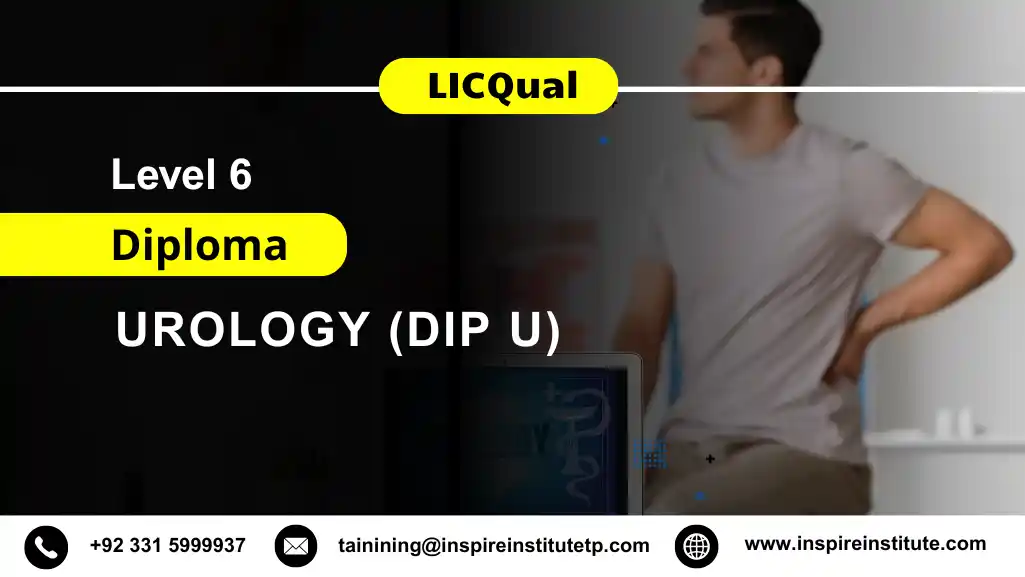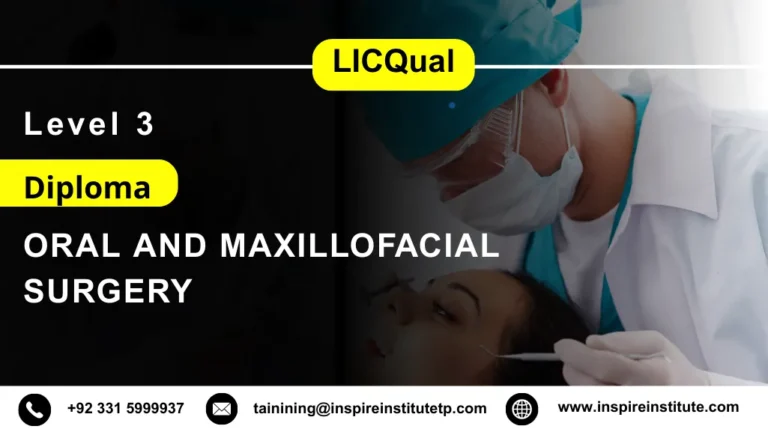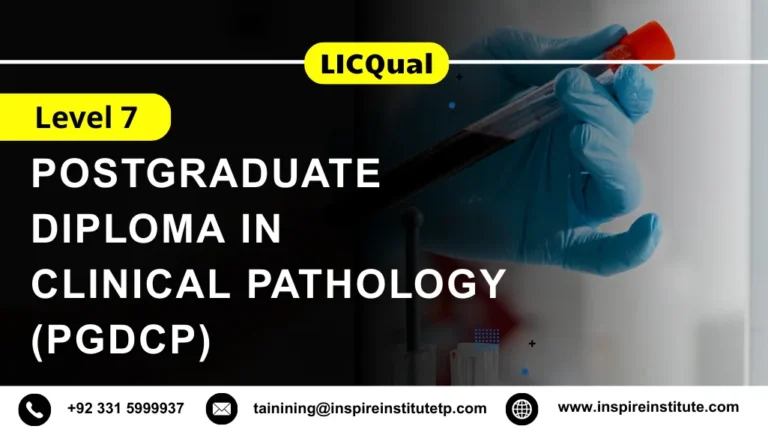LICQual Level 6 Diploma in Urology (Dip U)
The LICQual Level 6 Diploma in Urology (Dip U) is a UK-accredited qualification designed for healthcare professionals, surgeons, and medical practitioners seeking advanced expertise in urological medicine. Urology plays a critical role in diagnosing, managing, and treating disorders of the urinary tract and male reproductive system, making specialised knowledge in this field essential for improving patient outcomes. This assignment-based diploma combines theoretical understanding with practical application, preparing learners to excel in clinical, surgical, and research settings.
The course provides an in-depth exploration of urological anatomy, physiology, and pathology, equipping learners with the knowledge to manage conditions ranging from kidney stones and urinary tract infections to prostate disorders and urological cancers. Emphasis is placed on current diagnostic techniques, minimally invasive procedures, and emerging technologies in urology, ensuring participants gain relevant, up-to-date clinical competencies.
Learners develop advanced clinical and surgical skills through case studies, research assignments, and practical simulations. The program focuses on enhancing decision-making, patient assessment, and treatment planning abilities, enabling professionals to deliver evidence-based care. Collaborative practice is also emphasised, fostering effective teamwork with multidisciplinary healthcare teams.
This LICQual Level 6 Diploma in Urology (Dip U) empowers medical professionals to enhance clinical practice, develop advanced surgical and diagnostic skills, and become leaders in the management of urological conditions, making a measurable impact on patient care and healthcare outcomes globally.
Why Choose this Qualification
The LICQual Level 6 Diploma in Urology (Dip U) is a premier UK-accredited qualification designed for healthcare professionals, surgeons, and medical practitioners aiming to advance their expertise in urology. This diploma equips learners with specialised knowledge, clinical skills, and practical competencies essential for managing urinary tract and male reproductive system disorders. By combining theoretical depth with evidence-based training and practical applications, this qualification enhances professional credibility, career growth, and clinical impact in the field of urology.
Key Reasons to Choose this Qualification
Specialist Knowledge
- Gain comprehensive understanding of urological anatomy, physiology, and pathology.
- Learn to diagnose and manage conditions including kidney stones, urinary tract infections, prostate disorders, and urological cancers.
- Explore advanced diagnostic techniques such as imaging, endoscopy, and minimally invasive procedures.
- Develop knowledge in emerging technologies and innovations in urology.
- Build a solid foundation to support clinical decision-making in complex urological cases.
Practical Application
- Apply theoretical knowledge through case studies, simulations, and research-based assignments.
- Strengthen skills in patient assessment, treatment planning, and surgical interventions.
- Enhance proficiency in managing complex urological conditions in real-world settings.
- Collaborate effectively with multidisciplinary healthcare teams.
- Develop advanced problem-solving and clinical decision-making capabilities.
Recognised Qualification
- Earn a UK-accredited diploma that validates professional competence in urology.
- Gain an internationally recognised credential meeting global healthcare standards.
- Improve employability in hospitals, specialised urology clinics, and research institutions.
- Open pathways for postgraduate study or sub-specialisation within urology.
- Strengthen professional credibility in both local and international medical sectors.
Flexible Learning Pathway
- Study at your own pace through an assignment-based structure.
- Access online learning materials, expert mentorship, and interactive resources.
- Balance career responsibilities with academic advancement effectively.
- Progress through structured modules without interrupting professional commitments.
- Benefit from a tailored, flexible learning environment suited to individual needs.
Evidence-Based Training
- Engage with the latest clinical research and urological treatment protocols.
- Critically appraise medical literature and interpret clinical data.
- Implement validated interventions for improved patient care.
- Understand evidence-based approaches for complex urological cases.
- Strengthen research-driven decision-making in clinical practice.
Career Development
- Expand career opportunities in hospitals, urology clinics, and academic institutions.
- Prepare for roles such as Urology Specialist, Clinical Consultant, or Surgical Practitioner.
- Gain eligibility for advanced postgraduate training or fellowships.
- Build a strong professional profile in clinical practice and research.
- Enhance prospects for leadership, teaching, and healthcare policy roles.
Enhanced Patient Impact
- Deliver safe, ethical, and patient-centred urological care.
- Implement strategies for early diagnosis, preventive care, and effective interventions.
- Improve patient outcomes using evidence-based treatment plans.
- Apply culturally sensitive approaches in diverse healthcare settings.
- Contribute to long-term improvements in community and institutional healthcare delivery.
Professional Growth
- Develop leadership, communication, and analytical skills in clinical practice.
- Strengthen clinical reasoning, problem-solving, and decision-making abilities.
- Gain confidence in managing complex surgical and diagnostic cases.
- Foster reflective learning and interdisciplinary collaboration.
- Emerge as a skilled, knowledgeable, and confident urology professional.
The LICQual Level 6 Diploma in Urology (Dip U) is an essential qualification for healthcare professionals seeking to advance their expertise, improve patient outcomes, and achieve leadership roles in the field of urology. It offers a measurable impact on professional development, clinical competence, and healthcare excellence globally.
Course Overview
LICQual UK Awarding Body
Average Completion Time:
6-24 Months
Study Units: 6 Units
Evidence & Assignment Based
Mandatory Units
Who Should Take This Course
The LICQual Level 6 Diploma in Urology (Dip U) is specifically designed for healthcare professionals and medical practitioners who aim to enhance their knowledge and clinical expertise in urology. This qualification is suitable for individuals seeking to advance their career, improve patient care outcomes, and gain specialised skills in diagnosing and managing urological conditions. Through this programme, learners develop practical competence, evidence-based clinical decision-making, and leadership abilities applicable across hospitals, clinics, and academic institutions.
This course is suitable for
Medical Practitioners and Surgeons
- Develop specialised knowledge in urological anatomy, physiology, and pathology.
- Enhance clinical decision-making skills in managing complex urological conditions.
- Apply advanced diagnostic and surgical procedures safely and effectively.
- Integrate evidence-based protocols into day-to-day clinical practice.
- Strengthen competence in multidisciplinary collaboration for improved patient care.
Healthcare Professionals
- Gain practical skills in assessing, diagnosing, and treating urological disorders.
- Improve patient management strategies using up-to-date research and guidelines.
- Develop proficiency in monitoring patient outcomes and evaluating treatment effectiveness.
- Enhance ability to work in critical care and specialised urology units.
- Build a foundation for advanced roles and responsibilities in healthcare settings.
Aspiring Urology Specialists
- Acquire in-depth knowledge of prostate, kidney, bladder, and urinary tract conditions.
- Learn to implement innovative interventions and minimally invasive procedures.
- Prepare for advanced training, fellowships, or sub-specialisation within urology.
- Develop research and analytical skills applicable to clinical studies.
- Strengthen leadership and professional credibility within urology practice.
Nurses and Clinical Officers
- Gain insights into supporting surgical procedures and post-operative care.
- Learn patient assessment, monitoring, and nursing care specific to urology.
- Apply evidence-based practices in clinical and community settings.
- Enhance teamwork and communication skills with multidisciplinary teams.
- Build practical experience to contribute effectively in urology units.
Healthcare Administrators and Policy Makers
- Understand key clinical workflows and challenges in urology care delivery.
- Develop skills to design, implement, and evaluate urology-related programs.
- Integrate evidence-based practices into institutional policies.
- Enhance decision-making capabilities for resource allocation and quality care.
- Support the development of patient-centred and efficient urology services.
Researchers and Academicians
- Strengthen research skills in clinical urology studies and trials.
- Learn to evaluate and apply evidence-based findings to clinical practice.
- Develop critical analysis skills to contribute to academic publications.
- Explore innovations and advancements in urological medicine.
- Build expertise to teach and mentor future healthcare professionals.
International Healthcare Professionals
- Gain a globally recognised UK-accredited diploma enhancing career prospects abroad.
- Learn to manage urological cases in diverse healthcare settings.
- Apply culturally sensitive approaches to patient care.
- Enhance knowledge of international best practices in urology.
- Build professional networks with global healthcare experts.
Career Changers in Healthcare
- Transition into urology practice with a strong foundation of clinical knowledge.
- Acquire skills to manage urological conditions confidently and ethically.
- Gain practical exposure through case studies and research-based assignments.
- Develop critical thinking and problem-solving capabilities in healthcare.
- Open new pathways for career growth in medical and surgical disciplines.
This course is ideal for healthcare professionals seeking specialised training in urology. Completing the LICQual Level 6 Diploma in Urology (Dip U) equips learners with measurable expertise, advanced clinical skills, and enhanced professional credibility, enabling them to excel in both local and international healthcare settings.
Course Benefits
The LICQual Level 6 Diploma in Urology (Dip U) is a UK-accredited qualification designed for healthcare professionals, urology practitioners, and aspiring medical leaders who aim to advance their expertise in diagnosing, managing, and treating urological conditions. This comprehensive, assignment-based Diploma in Urology integrates theoretical foundations with practical applications, enabling learners to develop, implement, and evaluate effective urological care strategies. Through evidence-based learning and flexible study pathways, this qualification prepares professionals to deliver high-quality urology services, improve patient outcomes, and contribute to advancements in clinical urology practice.
Key Benefits of the Course
- Specialist Knowledge:
Gain in-depth understanding of urological anatomy, physiology, and pathology. Learners explore critical areas such as prostate, bladder, kidney, and urinary tract conditions. The course also covers advanced diagnostics, minimally invasive procedures, and urological pharmacology, equipping learners with the knowledge to manage complex urological cases confidently. - Practical Application:
Develop hands-on skills through case studies, clinical simulations, and research-based assignments. Learners enhance their ability to assess, diagnose, and treat urological conditions effectively. The program trains professionals to perform advanced procedures, collaborate with multidisciplinary teams, and implement evidence-based care plans for optimal patient outcomes. - Recognised Qualification:
Earn a prestigious UK-accredited Diploma in Urology (Dip U) that validates clinical expertise and professional competence. This internationally recognised qualification ensures learners meet global standards, enhancing credibility and opening career opportunities in hospitals, specialised urology clinics, academic institutions, and healthcare organisations worldwide. - Flexible Learning Pathway:
Designed for working medical professionals, the assignment-based structure allows learners to study without disrupting their careers. Learners can progress at their own pace, accessing digital resources, structured guidance, and personalised mentorship, providing a seamless balance between education and professional responsibilities. - Evidence-Based Training:
Engage with the latest research, clinical guidelines, and innovative urology practices. The course emphasizes applying evidence-based strategies in diagnostics, surgical interventions, and patient management. Learners gain the skills to critically evaluate scientific literature and implement validated practices that improve patient care and outcomes. - Career Development:
This qualification expands career prospects across hospitals, urology centres, research organisations, and academic institutions. Graduates may pursue roles such as Urology Specialist, Clinical Urologist, Research Coordinator, or Academic Lecturer. It also provides a foundation for advanced postgraduate studies or specialised urology training. - Enhanced Patient Impact:
Learn to deliver safe, ethical, and patient-centred urological care. The Diploma in Urology builds competence in addressing urinary disorders, improving patient quality of life, and implementing sustainable, culturally sensitive treatment approaches. Graduates are equipped to make a meaningful impact in diverse healthcare settings. - Professional Growth:
Strengthen critical thinking, clinical reasoning, leadership, and communication skills essential for urology practice. The Diploma in Urology encourages reflective learning, interdisciplinary collaboration, and strategic decision-making. Graduates emerge as competent, confident professionals capable of advancing standards in urological medicine globally.
The LICQual Level 6 Diploma in Urology (Dip U) empowers healthcare professionals to become leaders in urology through advanced knowledge, practical expertise, and globally recognised credentials. It enhances career prospects while contributing significantly to improved patient care and urological health outcomes worldwide.
Eligibility Criteria
The LICQual Level 6 Diploma in Urology (Dip U) is a UK-accredited qualification designed for healthcare professionals, urology practitioners, and aspiring medical leaders who aim to advance their expertise in urological care, diagnostics, and treatment. This assignment-based diploma integrates theoretical foundations with practical applications, preparing learners to assess, plan, implement, and evaluate urology programs and patient care effectively.
Educational Background:
Applicants should hold a recognised qualification in medicine, nursing, healthcare, or a related urology or clinical field. A Level 5 diploma or equivalent qualification in healthcare management, clinical sciences, or related disciplines may also be accepted. Candidates with international degrees in medicine, urology, or allied health disciplines will be evaluated individually to determine eligibility and equivalence to UK standards.
Professional Experience:
A minimum of one year of experience in healthcare, clinical practice, urology, or a related medical field is recommended. Previous exposure to patient care, surgical assistance, or clinical assessment provides an advantage. Motivated applicants with a strong interest in urology, surgical procedures, or patient management, even without direct professional experience, are encouraged to apply.
Age Requirement:
Applicants must be at least 18 years old at the time of enrolment. This ensures that learners possess the maturity, ethical understanding, and professional responsibility required for advanced study and practical application in urology.
Language Proficiency:
As the programme is delivered entirely in English, learners must demonstrate proficiency in reading, writing, and communication. A minimum IELTS score of 6.0 or an equivalent qualification is recommended for non-native English speakers to ensure effective participation in assignments, discussions, and assessments.
Technical Requirements:
Learners should have access to a computer or laptop with a reliable internet connection to participate in online learning, access study materials, and submit assignments. Basic computer literacy, including proficiency in research, data analysis, document preparation, and communication tools, is essential for academic success in this programme.
Required Documents:
Applicants are required to submit the following documents during registration:
A valid ID card or passport for identity verification.
Academic transcripts or certificates of previous qualifications.
Proof of professional experience in healthcare, clinical practice, or urology (if applicable).
The Qualification Process
LICQual Level 6 Diploma in Urology (Dip U) follows a structured pathway to ensure learners gain comprehensive knowledge, practical skills, and professional competence in community oral healthcare.
Step 1: Self-Assessment
Learners review the entry requirements to confirm eligibility. Candidates with a background in dentistry, oral health, or public health are encouraged to apply.
Step 2: Registration
Complete the registration process by submitting required documents such as proof of qualifications, a valid ID, and payment of enrollment fees.
Step 3: Induction
An induction session is conducted to:
- Verify learner eligibility and documentation.
- Introduce study materials, learning outcomes, and assessment procedures.
Step 4: Learning and Evidence Submission
Learners complete assignments, case studies, and practical exercises demonstrating competence in public health dentistry, community oral health assessment, preventive strategies, and program planning.
Step 5: Feedback and Revision
Assessors review submitted evidence and provide constructive feedback. Learners can revise and resubmit work to meet all required standards.
Step 6: Competence Validation
Final submissions are evaluated to confirm that learners have met all theoretical and practical learning outcomes.
Step 7: Internal Quality Assurance (IQA)
The IQA team reviews the assessment process to ensure accuracy, fairness, and compliance with international standards.
Step 8: External Verification (EQA)
External verifiers validate the authenticity and quality of learner achievements.
Step 9: Certification
Upon successful verification, learners are awarded LICQual Level 6 Diploma in Urology (Dip U), demonstrating advanced proficiency in community oral healthcare and preparing them for professional growth in dental public health, preventive dentistry, and healthcare policy.







